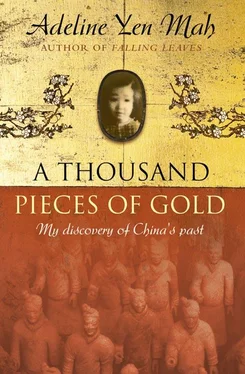From 770 until 476 BC, China was only nominally governed by the House of Zhou. This was known as the Spring and Autumn period during which China was initially divided into as many as 170 different semi-independent states. Each was ruled by its own feudal lord (some called themselves kings), its own hereditary ruling caste, and had its own court and bureaucracy. The feudal lords fought against each other, with the stronger states annexing the weaker ones.
By the beginning of the Warring States period (475–221 BC) this process of annexation had accelerated to such an extent that by 403 BC, only seven states remained. They were Qin, Zhao, Yan, Qi, Haan, Chu and Wei. Each state was headed by its own king, and the seven continued to wage war against one another. Gradually, it began to emerge that the state of Qin in north-west China was becoming the richest, strongest, largest and most efficient. Qin began systematically conquering and annexing the other states until King Zheng (259–210 BC) subdued them all and unified China in 221 BC. He called himself the First Emperor of the Qin dynasty (Qin Shi Huangdi) and planned for his dynasty to last for ten thousand generations.
The chronicle of this long period of civil war is vividly narrated by Sima Qian in his book Shiji. He brings history alive by including biographies of notable individuals — not only the emperors who reigned and the ministers who governed, but also the warlords who lost as well as the words and deeds of the philosophers, writers, merchants, landlords, thieves, paid assassins, comedians and teachers who lived and died during the reign of each ruler.
Released from prison after three years at the age of fifty, Sima regained Emperor Wu’s favour and was appointed ‘Palace Secretary’. Despite his disgrace, he was able to arrange an advantageous marriage for his only daughter. His son-in-law, Yang Shang, was a rising young star who eventually rose to become prime minister. Sima soon had a precocious grandson, Yang Yun, who was composing poetry at a very young age.
In Sima’s spare time, he continued to write, and completed his manuscript just one year before his death in 90 BC, but he never dared reveal his work during his lifetime for fear of offending the Emperor further. He buried one copy in the cave of a ‘famous mountain’. The other copy he left to his only daughter and talented grandson, Yang Yun.
Yang Yun became a marquis under Emperor Xuan (92–49 BC) and for a time enjoyed great favour at court. Yang judged it prudent to release Shiji some time between 73 and 54 BC and promoted it assiduously. Shiji was immediately popular and turned into a classic on which all later official Chinese histories would be modelled. It also became the first in a series of government-sponsored histories commissioned and compiled by the emperors of successive dynasties. The history of each dynasty was systematically recorded by court-appointed historians and illustrated with biographies of notable men (and an occasional woman) of that era. At present, there are more than 3600 volumes of official Chinese history, totalling over 45 million words, and describing events from the time of the Yellow Emperor to the present day.
By focusing his energy into creativity rather than despair, Sima Qian became the most famous Chinese historian who ever lived. Nowadays he is certainly better known than the emperor who punished him so severely for speaking his mind.
When I first heard the story of Sima Qian from my Ye Ye, I was only eight years old. Even at that early age, I remember being deeply moved by the Grand Historian’s plight. In those days, I was living in my father’s big house in Shanghai. My childhood was filled with fear and self-loathing. Although I never admitted it even to myself, I knew deep down that my stepmother despised me and wished to be rid of me. Perhaps because of this, I identified strongly and instantly with Sima Qian’s depression following his mutilation, although I didn’t fully understand what the term ‘castration’ implied. I only knew that it was something very bad and that he did not deserve the punishment.
I understood Sima Qian because I too felt that I had no one to turn to for justice. Life was unfair and I had to fend for myself. After being bullied or beaten, my only refuge was to bury myself in books or write short stories to assuage the rankling within my heart. In time, the characters in my make-believe world became more real to me than my tormentors at home. Unlike my family members, these imaginary figures provided constant comfort and consolation. Reading and writing carried me away from my real life and conveyed me to another realm. In that other kingdom, the playing field was level and the dice were no longer loaded against me.
In 1991, one year after my stepmother Niang’s death, I received permission from my brother James, executor of Niang’s will, to fly to Hong Kong and inspect her empty flat. ‘Everyone else’, James told me, ‘has chosen and taken what he or she wanted from Niang’s flat. All of her personal letters have been burnt because they are private. The rest is yours, including her flat, as soon as the probate is completed. I am a man of my word.’
At that time, I was still practising medicine full time in California but, at the back of my mind, I harboured vague thoughts about writing the book I had always meant to write, ever since I was a child. The day after my arrival in Hong Kong, I visited a bookshop in the hope of finding some Chinese proverbs to use as possible chapter headings. I did actually buy a volume but was not entirely satisfied with its contents.
Later that afternoon, I secured the keys of my stepmother’s flat from my brother and went to the familiar building. In Niang’s empty apartment smelling of mildew, mothballs, stale cigarette smoke and neglect, I came across two dusty books lying in the corner of a closet amidst a few discarded photographs. The first book I picked up was in English and entitled Selected Chinese Sayings by a writer named T.C. Lai. The second was a paperback copy of Shiji in Chinese.
I flipped open the cover of Selected Chinese Sayings and, with a pang, saw my father’s familiar signature at the top of the page. On the next page was printed the author’s dedication which read, ‘In memory of my father’.
Quickly, I perused the contents and saw that Selected Chinese Sayings consisted of a collection of the author’s favourite Chinese proverbs. I read that the book was first published in 1960 but reprinted in 1973, three years before Alzheimer’s disease took hold of my father’s mind. As I perused the proverbs, I could not help wondering whether this was a message from my father to give up medicine and begin my writing career. For once, Niang was not there to interrupt our communication.
Next, I took Father’s copy of Shiji and randomly turned the pages. This was where I first came across the letter written by Sima Qian to his friend.
In one passage, I read:
All these ancient writers had pain in their hearts, for they were not able to achieve in life what they had set out to accomplish … and so they felt compelled to write about their past, in order to pass on their thoughts to posterity…
I, too, have dared to venture forth and commit myself to writing. I have collected all the ancient customs that were dispersed or discarded. I have investigated the affairs of the past and probed the reasons for their buoyancy or decay. I would like to discern the patterns leading from the past to the present, proffering my views as one method of interpretation.
When I read these words, it almost seemed as if Sima Qian himself had stepped out of the pages of his book and was speaking to me personally, urging me to be strong and not falter in my resolve to become a full-time writer. Although we were separated by more than two thousand years, at that moment I understood him completely. He was telling me that there were many who had suffered unjustly in the past. A few, like himself, were able to transcend their hurt through literature. Was I prepared to follow in his footsteps and do the same?
Читать дальше












